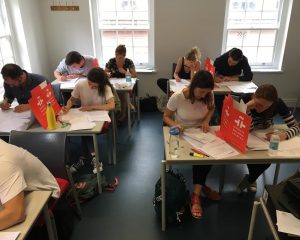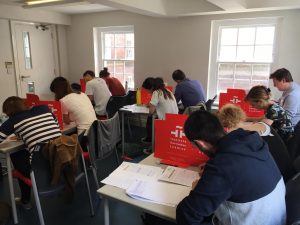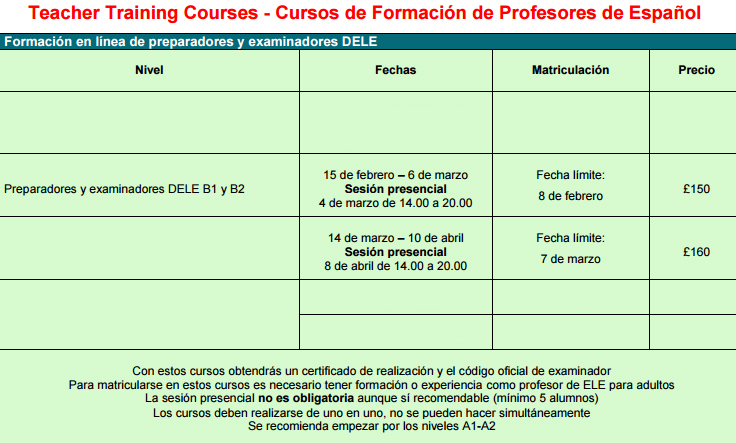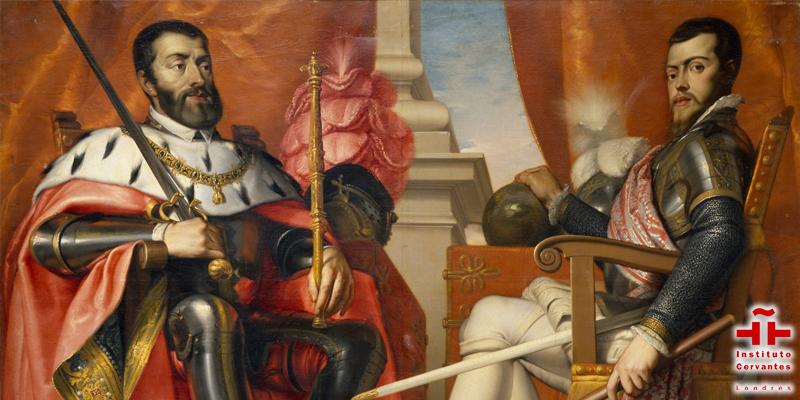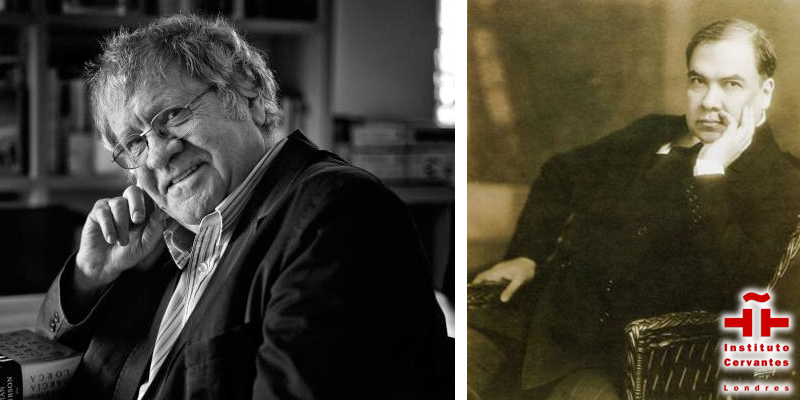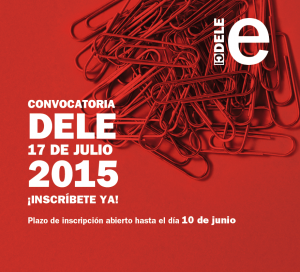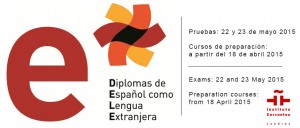Se publican las calificaciones de la convocatoria DELE de septiembre de 2022
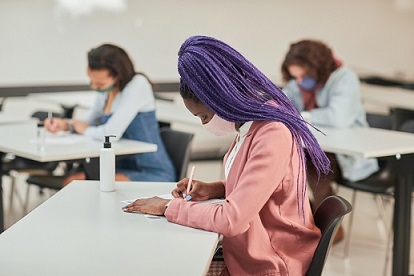
El Instituto Cervantes publica las calificaciones de la convocatoria DELE del nivel A2 del pasado mes de septiembre de 2022, en la que han resultado Aptos el 70% de los candidatos presentados.
Además, se informa de lo siguiente:
- El plazo de revisión de calificaciones se inicia mañana martes 1 de noviembre y finalizará el día 31 de ese mismo mes.
- Los candidatos que hayan consignado su correo electrónico en el momento de la inscripción habrán recibido, adjunto al correo electrónico de comunicación, el archivo electrónico de su certificación de calificaciones. Todos los candidatos DELE pueden acceder a su certificación electrónica de calificaciones con valor certificador en su espacio privado del portal de Exámenes del Instituto Cervantes.
- Los candidatos NO APTOS o NO Presentados que quieran solicitar revisión de calificaciones deben enviar su solicitud a través del formulario electrónico habilitado en su espacio privado del portal de Exámenes del Instituto Cervantes.
- Las solicitudes de revisión de candidatos APTOS se tramitarán a través del Centro de Atención al Usuario (CAU), indicando en el tema Pruebas DELE, y En concreto con seleccionando Revisión de calificaciones.
Más información aquí
William Frost: «I think Spanish is a wonderful language and I feel like it is the most useful language to be learning right now»

William Frost is originally from Shrewsbury, but now he lives in Canterbury. He has moved around a lot as he teaches English as a foreign language; he spent two years teaching in Cologne, Germany. He also taught in London for some time where he came into contact with a lot of Spanish and Spanish speaking students.
He has done some independent journalism and video making mainly on the topic of Latin America and Iberia. Now he is training to become a secondary school teacher at Canterbury Christ Church University specialising in Spanish and French (Modern Foreign Languages). He is really enjoying this new challenge as it requires a lot of different skills.
– How did you become interested in learning Spanish?
Good question! I have always been interested in languages, but for a long time I knew almost no Spanish as I did not learn it at school or university. It soon became clear to me that if I wanted to have a career in languages then knowing at least some Spanish would be essential as it is such a widely spoken language in the world.
It was actually mainly through friends and ex-students that I had taught that got me into learning Spanish. I have found that if you make an effort to learn the language then native speakers will always encourage you, to help you progress.
– What do you like the most about Instituto Cervantes London?
I did used to go there to use the library which is fantastic; there is an brilliant selection of resources such as books, magazines, newspapers and films. The variety of books is great as you can find grammar and text books but also literature, history and art books. It caters to all tastes.
I also attend the conversation clubs. When I lived in London I used to go to the institute in person, but now I access them online. These are great sessions where we discuss a different topic each time, subjects like urbanism, global warming and climate change. The best thing about the sessions is that they are spaces where you can practice your speaking and listening skills in an unpressured environment. There are always native speakers conducting the sessions so if you are struggling with something they will help you out. Speaking is the skill I find most challenging so this benefits me a lot.
I have also attended some online cultural events such as a tribute to Mario Benedetti which as great as there were some live poetry readings in Spanish and English. I have a special interest in Uruguay so that one really caught my eye. The accent in that part of that world is a bit different so it was good to be able to listen to it. Uruguay is an amazing country and I hope to go back there when my Spanish is better!
– What do you like the most about learning the language?
What I like about learning Spanish is that you know that what you are learning is highly useful as so many countries in the world speak it as their mother tongue. This means that you have an insight into other parts of the world, especially Latin America. Also the sheer variety of different resources available means that whatever you are interested in you will be able to find something in Spanish. I have been watching some documentaries about South America on Netflix in Spanish recently which has helped a lot. I am also a fan of Pedro Almodóvar’s films so I enjoy watching them.
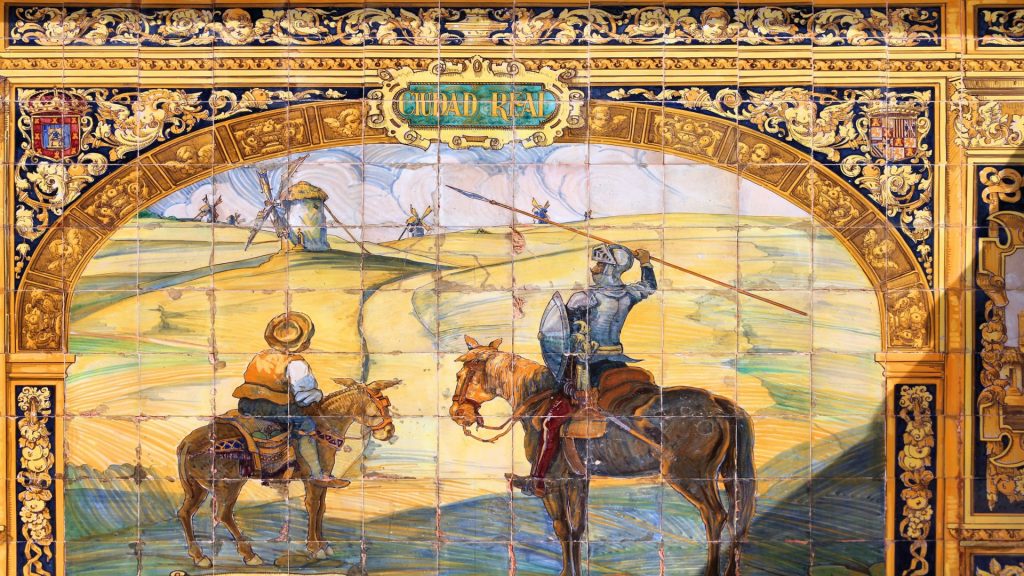
– Do you use Spanish in your daily life or do you plan to use it for your work?
I do use Spanish as part of my teacher training and I intend on using it a lot more when I qualify. Spanish is growing steadily in popularity at schools and this is reflected in the rise in pupils choosing to take it at both GCSE and A levels.
I also use it to read Spanish language newspapers online such as El País, which helps me keep up to date with what is going on.
– Why did you become interested in getting a certificate for Spanish language?
I became interested in doing the DELE certificate really because I wanted to know what my level was and what I needed to improve on. In that respect it was really useful. I also think it is really practical to have a clear goal in mind to focus your studies. That extra bit of pressure helps to structure what you are learning. It is also something more concrete to put on your CV or to talk about at interview.
I was lucky enough to visit the Cervantes Institute headquarters in Madrid last year were I saw some interesting exhibitions about Spanish in the world. It was there that I found out about the DELE exams. It is a fantastic place; if you get the chance to visit, I highly recommend it.
– How did you find the exam?
The exam was like all exams, a bit nerve wracking but completely worth it. You get a good sense of satisfaction once you find out you have passed! I had my speaking at the institute in central London and the other parts at the Cañada Blanch School in Kensington. Everything was seamlessly organised and ran smoothly. All of the staff at the Cervantes were very friendly and professional.
The certificate you get is the most elegant document I have ever seen. It was addressed to “Don William” which made it seem very official but I also it found hilarious!
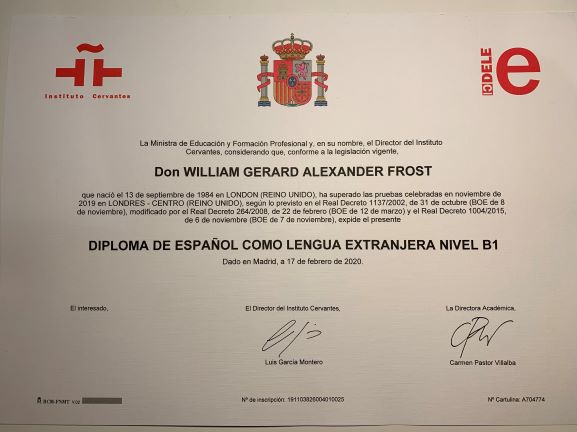
– Do you plan to continue studying Spanish?
I definitely plan to continue studying Spanish, I think it is a wonderful language and I feel like it is the most useful language to be learning right now. Learning in a language is a marathon not a sprint so I am in it for the long haul. It took me ages to remember that piragüismo means canoeing and I recently learned that pencil sharpener is sacapuntas. And I still get a bit confused between ustedes and vosotros, but I’m getting there! You have to keep topping up and refreshing your knowledge as it’s so easy to forget vocabulary! I am also considering taking the DELE B2 or C1 exam next year. ¡Adelante!
The Cervantes Institute has been brilliant in helping me improve my Spanish. But I have also learned about Spanish culture and how the language is used all over the world. At the moment, as travelling is so challenging with the pandemic, all of the online events and resources have been fantastic.
Enrol now! New 2021 DELE Spanish exam sessions available!
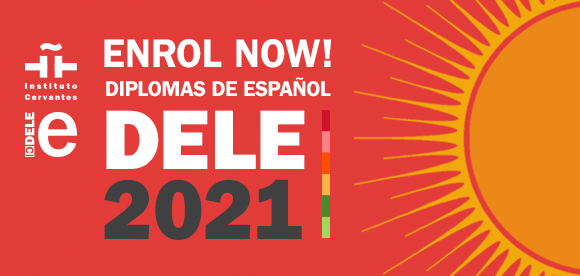
The DELE Spanish Diplomas are official qualifications certifying the degree of competence and mastery of Spanish, granted by Instituto Cervantes on behalf of Ministry of Education and Vocational Training of Spain and, Ministry of Foreign Affairs, European Unión and Cooperation of Spain.
The DELE examinations have been designed following the guidelines of the Common European Framework of Reference for Languages (CEFR) of the Council of Europe.
DELE 2021 exam sessions in May, July, September and November at Instituto Cervantes in London.
- 21 May (written and oral exam). DELE for Young Learners: Levels A1 and A2/B1
Registration deadline: 10 March - 22 May (written exam), 21/22 May (oral exam). Levels: A1, A2, B1, B2, C1, C2*
Registration deadline: 10 March - 9 July (written exam), 9/10 July (oral exam). Levels: A2, B1, B2, C1*
Registration deadline: 5 May - 10 September (written and oral exam). Level: A2
Registration deadline: 7 July - 12 November (written and oral exam): DELE for Young Learners: Levels A1 and A2/B1
Registration deadline: 29 September - 13 November (written exam), 12/13 November (oral exam). Levels: A1, A2, B1, B2, C1, C2*
Registration deadline: 29 September
*Please note that the oral and written exams may not take place on the same day
For more information, visit our website.
El Instituto Cervantes aumenta su presencia en Escocia

El director del Instituto Cervantes, Luis García Montero, y el responsable del Departamento de Español de la Universidad de Aberdeen (Escocia, Reino Unido), Jesse Barker, firmaron un convenio de cooperación académica y cultural que convierte a dicha universidad en centro oficial examinador del Diploma de Español (DELE) que administra el Cervantes.
El acuerdo suscrito integra a la School of Language, Literature, Music and Visual Culture de la Universidad de Aberdeen en la red de centros de examen del Instituto en el Reino Unido. La primera convocatoria se celebrará el próximo mes de mayo con el apoyo del Cervantes de Mánchester (Inglaterra), centro al que está adscrito el acuerdo.
Con el convenio firmado ayer por la tarde en la tercera ciudad más importante de Escocia, se refuerza la presencia del Instituto Cervantes en el norte de Gran Bretaña, con el objetivo de atender el creciente interés de los alumnos británicos por obtener el diploma DELE, certificación internacional de dominio del español.
La Universidad de Aberdeen se suma a otros tres centros educativos escoceses que celebran exámenes DELE: la Universidad de Strathclyde (Glasgow), el Edinburgh College (Sighthill Campus) y SALT Edinburgh, Academia de Lengua y Traducción en Edimburgo. El número de candidatos en Escocia aumentó en 2019 un 60% respecto al año anterior, y en 2020 se espera un crecimiento similar.
«Embajadores del español»
La presencia del Instituto Cervantes en el norte del Reino Unido, y en particular en Escocia, se ha reforzado en los últimos años gracias a la planificación conjunta de actividades culturales con las universidades escocesas desde el centro de Mánchester, en especial sobre historia, arte, literatura y cine. En la oferta cultural en español destacan la puesta en marcha del «Club de Cine Luis Buñuel» en las universidades de Aberdeen y Strachclyde (Glasgow) y el programa «Embajadores del español», destinado a jóvenes universitarios interesados por difundir la lengua española y la cultura hispanohablante.
García Montero se ha reunido además con los responsables de los departamentos de Español de cuatro universidades escocesas (Edimburgo, Dundee, Strachclyde y Saint Andrews), a quienes ha agradecido la labor en la promoción del español y les ha animado a proponer iniciativas que aumenten el interés de los alumnos por el mundo hispánico. Han participado el cónsul general de España en Edimburgo, Ignacio Cartagena Núñez, y el director del Instituto Cervantes de Mánchester, Francisco Oda-Ángel.
Invitado por la Asociación de Estudiantes Lawyers Without Borders de la Universidad de Aberdeen, Luis García Montero ha participado también en el VI Congreso Anual de Derechos Humanos, cuyo tema central ha girado sobre la libertad de los artistas en la promoción de los derechos fundamentales y donde ha impartido una conferencia.
Interest to learn Spanish increases: official DELE exams in may grow 21% in London
On May 24th and 25th, Instituto Cervantes in London will hold 2019’s first set of , the official Diplomas of Spanish as a Foreign Language (DELE) Diplomas. The enrolment in these programmes is at 163 students. This figure Spanish represents a 21% increase compared to the number of students that took the same exam on the same date in 2018.
The DELE Spanish Diplomas are official qualifications certifying the degree of competence and mastery of Spanish, granted by Instituto Cervantes on behalf of Ministry of Education and Vocational Training of Spain and, Ministry of Foreign Affairs, European Unión and Cooperation of Spain.
In the 2019 DELE applications, the most popular qualification is A2 (49 applications), followed by level B1 (29 applications) and the B2 test (24 applications). The DELE examinations are designed following the guidelines of the Common European Framework of Reference for Languages (CEFR) of the Council of Europe.
The Director of the Instituto Cervantes in London, Ignacio Peyró, said of the increase: “In a country that has traditionally had little attachment for certification, these figures are very positive. The DELE is a test of great quality, and its certification is very useful for curricular purposes – these are two keys to its success”.
Additionally, the DELE diplomas are a compulsory test for Sephardic Jews who are now able to claim Spanish nationality thanks to a new law. The Law introduced in June 2015 makes the acquisition of Spanish citizenship possible for the Sephardic Jews that are descendants of those expelled from Spain in the 15th Century without renouncing their current citizenship and without requiring residency in Spain.
This is the case of Andy, a British student with Sephardic Jew ancestry who took DELE exam in February to apply for the Spanish nationality. “After the Spanish government passed the Sephardic law, I looked into my family history and my family tree and I realized that I could ask for the Spanish citizenship. I had already studied Spanish at school, I travel to Spain frequently and I have many Spanish friends, so it was not difficult for me to pass the exam,” says Andy.
The Diplomas of Spanish as a Foreign Language (DELE) are official qualifications which prove the level of proficiency in the Spanish language and which are awarded by the Spanish Ministry of Education and Science. In short, these are the only qualifications in the world to prove fluency in Spanish.
What are the advantages of having a DELE qualification?
- They are official qualifications.
- They are recognised internationally by private companies, chambers ofcommerce and public and private educational organisations.
- In Spain, they give you access to universities, official language schools, business schools and jobs with the civil service.
- They are increasingly more in demand at universities in other countries.
- They are valid indefinitely: qualifications for life.
- They comply with the guidelines of the Common European Framework (MCER).
- They make it easier for you to work and study in other countries and also to obtain grants.
«Instituto Cervantes in London organizes specific courses for the preparation of DELE candidates and they are always very well received: there are courses once a week throughout the term, but also intensive courses in the weeks prior to each call,» says Pablo Martínez Gila.
Given the good reception of the diplomas, the Cervantes Institute in London reinforces the offer of DELE preparation courses for all levels with a wide range of options in May and July.
In addition to the May session, there will be more DELE 2019 exam sessions at the Instituto Cervantes in London on these dates:
– 12 July (written exam), 12/13 July (oral exam). Levels: A2, B1, B2, C1- Registration deadline: 16 May
– 13 September (written and oral exam). Level A2 – Registration deadline: 24 July
– 22 November (written and oral exam), DELE for Young Learners: Levels: A1, A2/B1 – Registration deadline: 9 October
– 23 November (written exam), 22/23 November (oral exam). Levels: A1, A2, B1, B2, C1, C2 – Registration deadline: 9 October
Aumenta el interés por el español: los exámenes oficiales DELE de mayo crecen el 21% en Londres
Los días 24 y 25 de mayo se celebrará la primera convocatoria de 2019 en el Instituto Cervantes de Londres de los exámenes oficiales DELE, los Diplomas de Español como Lengua Extranjera. Para esta sesión el número de participantes en Londres ha alcanzado un total de 163 inscritos. La cifra supone un aumento del 21% respecto a la misma convocatoria de 2018.
En esta convocatoria del DELE, el nivel más demandado es A2, con 49 candidatos; seguido del nivel B1, con 29 candidaturas; y la prueba de B2, con 24 candidaturas. Los exámenes DELE están diseñados siguiendo las directrices del Marco Común Europeo de Referencia (MCER) del Consejo de Europa.
“En un país que tradicionalmente ha tenido poco apego por la certificación, estas cifras son muy positivas. El DELE es un examen de enorme calidad, y su certificación es muy útil a efectos curriculares -esas son dos claves de su éxito”, asegura el director del Instituto Cervantes de Londres, Ignacio Peyró.
Por otro lado, los diplomas DELE son pruebas necesarias para personas que optan a la nacionalidad española. En estas últimas convocatorias está siendo de especial relevancia el número de sefardíes que aprovechan la oportunidad del Estado español para solicitarla. El Congreso de los Diputados aprobó en junio de 2015 la Ley 12/20151, en materia de concesión de la nacionalidad española a los sefardíes originarios de España.
Este es el caso de Andy, un británico con ascendentes sefardíes que hizo el examen DELE en febrero para poder solicitar la nacionalidad española. “Tras aprobarse la ley sefardí hace cuatro años, indagué en mi historia familia y mi árbol genealógico y me di cuenta de que podía pedir la nacionalidad. Ya había estudiado español en el colegio, viajo a España con frecuencia y tengo muchos amigos españoles, así que no fue difícil para mí aprobar el examen”, comenta Andy.
Los Diplomas de español DELE son títulos oficiales, acreditativos del grado de competencia y dominio del idioma español, que otorga el Instituto Cervantes en nombre del Ministerio de Educación y Formación Profesional y Ministerio de Exteriores, Unión Europea y Cooperación de España.
En el año 2018, en el que hubo cuatro convocatorias de exámenes DELE, el total de inscritos en Londres fue de 392. Los niveles con mayor número de candidatos fueron para el B2 (101 candidatos), que acredita la competencia lingüística necesaria para entender las ideas principales de textos complejos que traten de temas tanto concretos como abstractos, incluso si son de carácter técnico, y producir textos claros y detallados sobre temas diversos.
Otros niveles con mayor número de candidatos fueron el de A2 (97 candidatos), que acredita que el candidato es capaz de comprender frases y expresiones cotidianas de uso frecuente relacionadas con áreas de experiencia que le son especialmente relevantes (información básica sobre sí mismo y su familia, compras, lugares de interés, etc.).
En el caso del nivel C1, hubo 70 candidatos en las convocatorias DELE de 2018. El diploma DELE C1 garantiza que el progreso del estudiante en el idioma se ha producido con éxito y que posee un nivel más que avanzado de español. En el caso del nivel DELE B1, que acredita la competencia lingüística necesaria para comprender los puntos principales de textos claros y en lengua estándar sobre cuestiones conocidas; describir experiencias, acontecimientos, deseos y aspiraciones; explicar planes; y justificar opiniones brevemente, hubo un total de 66 candidatos.
“El Instituto Cervantes de Londres organiza cursos específicos para la preparación de los candidatos y tienen siempre muy buena acogida: hay cursos de una vez por semana a lo largo del trimestre, pero también cursos intensivos en las semanas previas a cada convocatoria”, asegura el Jefe de Estudios del Instituto Cervantes de Londres, Pablo Martínez Gila.
Ante la buena acogida de los diplomas, el Instituto Cervantes refuerza la oferta de cursos de preparación al DELE para todos los niveles con un gran abanico de opciones en mayo y julio.
Además de la convocatoria de mayo habrá más convocatorias de exámenes DELE a lo largo del año 2019 en el Instituto Cervantes de Londres.
- El 12 y 13 de julio hay convocatoria de los A2, B1, B2 y C1. El plazo de inscripción está abierto hasta el 16 de mayo
- El 13 de septiembre hay pruebas del nivel A2 y la inscripción está abierta hasta el 24 de julio
- El 22 de noviembre tiene lugar el DELE escolar: Niveles: A1, A2 y B1. La inscripción está abierta hasta el 9 de octubre
- El 22 y 23 de noviembre hay convocatoria de los niveles A1, A2, B1, B2, C1, C2. La inscripción está abierta hasta el 9 de octubre
Esta semana en el Instituto Cervantes de Londres / The Week At The Instituto Cervantes London
Lunes 8 febrero 2016
Último día de matrícula para la formación a distancia de profesores (curso 15 febrero – 6 marzo): Curso para preparadores y examinadores DELE B1 y B2
———————————————————————————
Último día de matrícula para la formación a distancia de profesores (curso 15 febrero – 6 marzo): Curso para preparadores y examinadores DELE escolar A2/B1
———————————————————————————
Primer día del curso intensivo de español para principiantes (30 horas, 2 semanas): L-V 10:30h – 13:30h.
______________________________________________________________
Martes 9 de febrero 2016
Fernando Checa, Laura Fernández-González: La cultura del ocio en la época de los Habsburgo en España. En inglés y español con traducción simultánea
Entrada libre. Haz clic aquí para reservar plaza
______________________________________________________________
Jueves 11 febrero 2016
Ian Gibson: Rubén, 100 años – conmemoración del centenario del fallecimiento del poeta Rubén Darío (1867 – 1916). En inglés con lectura bilingüe de textos de Rubén Darío
Entrada libre. Haz clic aquí para reservar plaza
_________________________________________________________________
_________________________________________________________________
_________________________________________________________________
Monday 8 February 2016
Last day to enrol in the online teacher training (15 February – 6 March): examiners of DELE B1 and B2
———————————————————————————
Last day to enrol in the online teacher training (15 February – 6 March): examiners of DELE A2/B1 for young learners
———————————————————————————
First day of the 30-hour, 2-week intensive Spanish course for absolute beginners and beginners: M-F 10.30am to 1.30pm.
______________________________________________________________
Tuesday 9 February 2016
Fernando Checa, Laura Fernández-González: Festival Culture In The World Of The Spanish Habsburgs. In English and Spanish with simultaneous translation
Free entry. Click to RSVP
______________________________________________________________
Thursday 11 February 2016
Ian Gibson: Rubén, 100 years – Marking the centenary of Rubén Darío’s Death (1867 – 1916). In English with bilingual reading of Rubén Darío’s texts
Free entry. Click to RSVP
Prepara tu prueba DELE con un curso específico para tu nivel – Prepare for your DELE exam with a level specific course
Con la nueva convocatoria DELE del 17 y 18 de julio, de nuevo ponemos en marcha los cursos de preparación, para ayudarte a superar las pruebas que llevan al Diploma de Español como Lengua Extranjera. Si quieres preparar tu examen DELE con nosotros, ahora puedes hacerlo con 6 sesiones semanales, repartidas de la siguiente manera:
Preparación DELE nivel B1: del 6 de junio al 11 de julio, los sábados de 14 a 17h.
Preparación DELE nivel B2: del 10 de junio al 15 de julio, los miércoles de 18:30 a 21:30h.
Preparación DELE nivel C1: del 6 de junio al 11 de julio, los sábados de 10 a 13h.
Cada curso tiene un coste de £212. Puedes efectuar matrícula contactándonos en la dirección de correo electrónico aclon1@cervantes.es o en el número de teléfono ![]() 0207 235 0353.
0207 235 0353.
Consulta la oferta completa de cursos aquí
_________________________________________________________________
With the upcoming DELE exams taking place on 17 and 18 July, our preparation courses have been made available again, to help you pass the tests that lead to the Diploma de Español como Lengua Exntranjera. If you would like to prepare for your DELE exam with us, you can do it in 6 weekly sessions, on the following dates:
DELE level B1 preparation: 6 June to 11 July, Saturdays 2-5pm.
DELE level B2 preparation: 10 June to 15 July, Wednesdays 6:30-9:30pm.
DELE level C1 preparation: 6 June to 11 July, Saturdays 10am-1pm.
Each course is £212. You can enrol by emailing aclon1@cervantes.es, or calling us on ![]() 0207 235 0353.
0207 235 0353.
See all upcoming courses here
Qué hacer tras matricularse en las pruebas para obtener el Diploma de Español como Lengua Extranjera (DELE) – What to do after registering for the Diploma in Spanish as a Foreign Language (DELE) exam
A nuestras oficinas en Eaton Square se acercan cada vez más personas interesadas en certificar su nivel de dominio del español. A lo largo de los años, los alumnos han valorado el hecho de que los títulos DELE sean los únicos reconocidos internacionalmente, además de ser más económicos que otras alternativas de diplomas de español en Londres. Obtener un certificado oficial en una segunda lengua implica incrementar el propio abanico de oportunidades sociales y profesionales. Estamos orgullosos de emitir cada vez más Diplomas de Español como Lengua Extranjera, y cada año son más quienes notan el beneficio directo de poseer un título DELE.
Una duda común entre aquellos que se inscriben en los exámenes DELE a lo largo del año es la naturaleza y componentes del examen. Es natural; preparando de manera sistemática las claves de una prueba, es más sencillo obtener resultados y cumplir objetivos. Con el fin de dar recursos aplicables a todos los inscritos en las pruebas DELE del próximo 22 y 23 de mayo, hemos puesto en marcha cursos especiales de preparación que comienzan esta misma semana, y a los que todavía es posible apuntarse.
Los cursos de preparación para las pruebas DELE comienzan entre el 18 y el 23 de abril, según el nivel de la prueba. Todavía quedan unas plazas libres, y puedes matricularte eligiendo nivel aquí y llamando al 0207 235 0353, o escribiendo a aclon1@cervantes.es, para completar el proceso.
___________________________________________________________________________________________
Increasing numbers of students are asking about ways to certify their knowledge of Spanish in our offices in Eaton Square. Over the years, we have noticed that learners of Spanish value the Diploma in Spanish as a Foreign Language DELE for being the only internationally accepted diploma in Spanish, but also because it is, in fact, cheaper than other Spanish certifications available in London. An official certificate in a foreign language is an fast-speed ticket to increasing the number of opportunities for professional, as well as social, development.
A common question among those who register for one of our DELE editions throughout the year refers to the nature and components of the exam. This is only natural; systematic work prior to any test leads to a satisfactory outcome and a sense of accomplishment. In order to give applicable resources to all students sitting the DELE exam on 22 and 23 May 2015, we are holding a number of special preparation courses, which start this week and where it is still possible to enrol.
The DELE preparation courses start between 18 and 23 April (different levels start on different days), and there are still a few spots left. You can choose your level here, and call 0207 235 0353 or email aclon1@cervantes.es to enrol.
Aprende español este verano | Spanish summer courses enrol now!
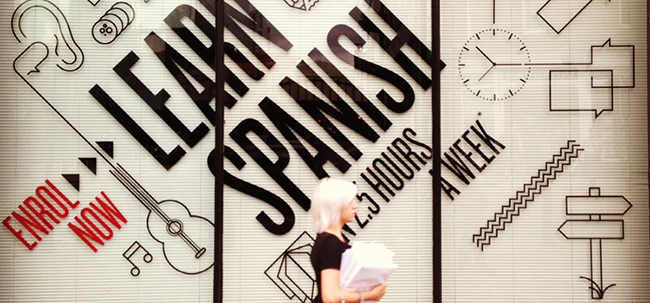
El Instituto Cervantes ofrece cursos de español para estudiantes de todos los niveles, desde principiante absoluto hasta perfeccionamiento (A1 – C2 del MCER), cuyo objetivo es desarrollar la capacidad del alumno de comprender, hablar, leer y escribir en español.
Asimismo ofrece un amplio abanico de cursos específicos, como los cursos por Internet del Aula Virtual de Español (AVE), cursos de preparación del Diploma de Español como Lengua Extranjera (DELE) y de los exámenes de GCSE, AS y A2, español orientado al mundo de los negocios, español para personal médico, traducción, cursos de lengua y cultura (literatura, historia), conversación, bailes latinos, español para niños y cursos de formación de profesores ELE. Otros cursos fuera de programa y clases particulares y en empresas también están disponibles.
Para más información visite nuestra página web www.londres.cervantes.es o contacte con la oficina de matriculación de lunes a sábado llamando al 0207 235 0353.
The Instituto Cervantes offers Spanish language courses for all levels, from complete beginners to proficiency (A1 – C2 of the CEFR), aimed at developing the students’ ability to understand, speak, read and write in Spanish.
We also offer a wide range of more specific courses such as online courses (AVE), courses to prepare for the DELE Spanish official exams, GCSE, AS and A2 levels, general business Spanish, Spanish for medical professionals, translation, language & culture (literature, history), conversation courses, Latin dance, Spanish for children and teacher training courses. Other courses and private and corporate tuition are available on demand.
For full details please visit our website www.londres.cervantes.es or contact the Enrolment Office, Monday to Saturday, on 0207 235 0353.
